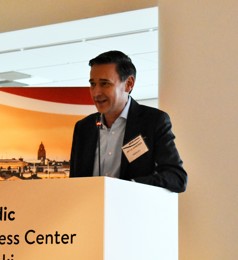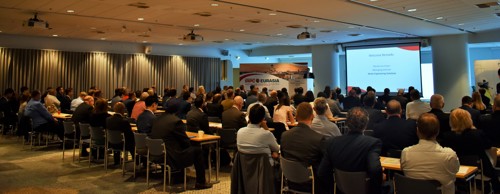IRPC EurAsia '19: Neste CEO touts energy transformation through renewables, sustainability
Adrienne Blume, Executive Editor, Hydrocarbon Processing
HELSINKI—Peter Vanacker, President and CEO of Neste Oy, welcomed the crowd at the International Refining and Petrochemical Conference (IRPC) EurAsia in Helsinki, Finland on June 5.
Tackling the climate crisis. Vanacker discussed Neste's primary mission in addressing the worldwide climate crisis. Fifteen years ago, the company decided to invest €1.5 B to fight climate change, which was considered a risky move for an oil refining company. Neste investors, customers, and even employees were not entirely convinced about the initiative, the CEO explained.

Fig. 1. Peter Vanacker, President and CEO, Neste, opened IRPC EurAsia in Helsinki.
However, "innovation is at the heart of this transformation," Vanacker said. "You need to keep on innovating; otherwise, you can't survive. This has always been at the core of what Neste has striven to do."
Leading renewable energy production. "Courage, confidence and stamina were essential to changing the course of the company, against all odds," Vanacker said. "Today, more than 70% of Neste's profit comes from the area of renewable products, which are produced from waste and residue."
Neste recently decided to invest €1.4 B in Singapore to produce renewable jet fuel and other products. Helping the aviation industry reduce its carbon emissions is another top priority for the company.
"With these types of renewable products, we enable our customers to reduce their greenhouse gas emissions by the equivalent of [emissions from] roughly 3 MM cars per year," Vanacker explained.
Products like renewable diesel can also extend the useful life of the combustion engine. "I don't believe that the combustion engine is dead," Vanacker said. Neste also plans to move into the chemicals and polymers business, particularly in the areas of renewable plastics and chemically recyclable plastics.
Meeting the sustainability challenge. As a result of these changes and initiatives, Neste is ranked as the world's most sustainable energy company in 2019.
"In our renewable energy strategy, we made two promises to society," Vanacker said. "We promised to help our customers reduce their greenhouse gas emissions by at least 20 MMtpy, every year. We also promised to reduce our carbon footprint ahead of targets set by the EU, which we are working on now."

Fig. 2. A packed crowd was on-hand during the opening of IRPC EurAsia.
Looking ahead: European refining 2050. Stephen George, Chief Economist at KBC, next discussed the European refining industry's vision to 2050 in a second keynote address.
The "Vision 2050" document published by FuelsEurope, the European refining association, is an assessment of the evolution of demand for refined products and the technologies that will transform the refining landscape, including electric vehicles (EVs) and low-carbon initiatives.
George sees a continued evolution from fuels to feedstocks as petrochemicals demand continues to grow, while transport fuels demand will peak and then start to decline after 2040. A short-term resurgence in gasoline is expected to be replaced by EVs.
A longer-term role exists for middle distillates in aviation and heavy goods transport, while the bottom of the barrel will continue to evolve away from fuel oil for bunker and other uses. Shipping is likely to evolve toward LNG, depending on the availability of supply and the buildout of needed infrastructure.
Climate initiatives. National climate action plans are expected to be ratified by the end of the year for the implementation of binding targets through 2030. "The best technology available to us today is energy efficiency initiatives, such as reduced flaring, waste heat recovery and integration with nearby industrial sites," George said.
A second phase of Vision 2050 includes the use of renewable electricity, replacing steam-driven equipment and the use of green hydrogen. In the third phase, the greenhouse gas intensity of refined products consumption must be reduced with the use of biomass, biofuels, green hydrogen, plastics and petrochemicals recycling, and vehicle fuel efficiency improvements, George said.
"Digitalization is also going to be a part of everything we do going forward," George noted. Digitalization will help increase operational efficiency and, in turn, increase energy efficiency.
"Companies are taking a multi-faceted approach to tackling these issues," George explained. "But as Peter [Vanacker] said, there is no 'silver bullet' or single solution, so we need to be thinking broadly about how we're going to address these strategies within our companies."
IRPC EurAsia is taking place in Helsinki from 5–6 June.






Comments